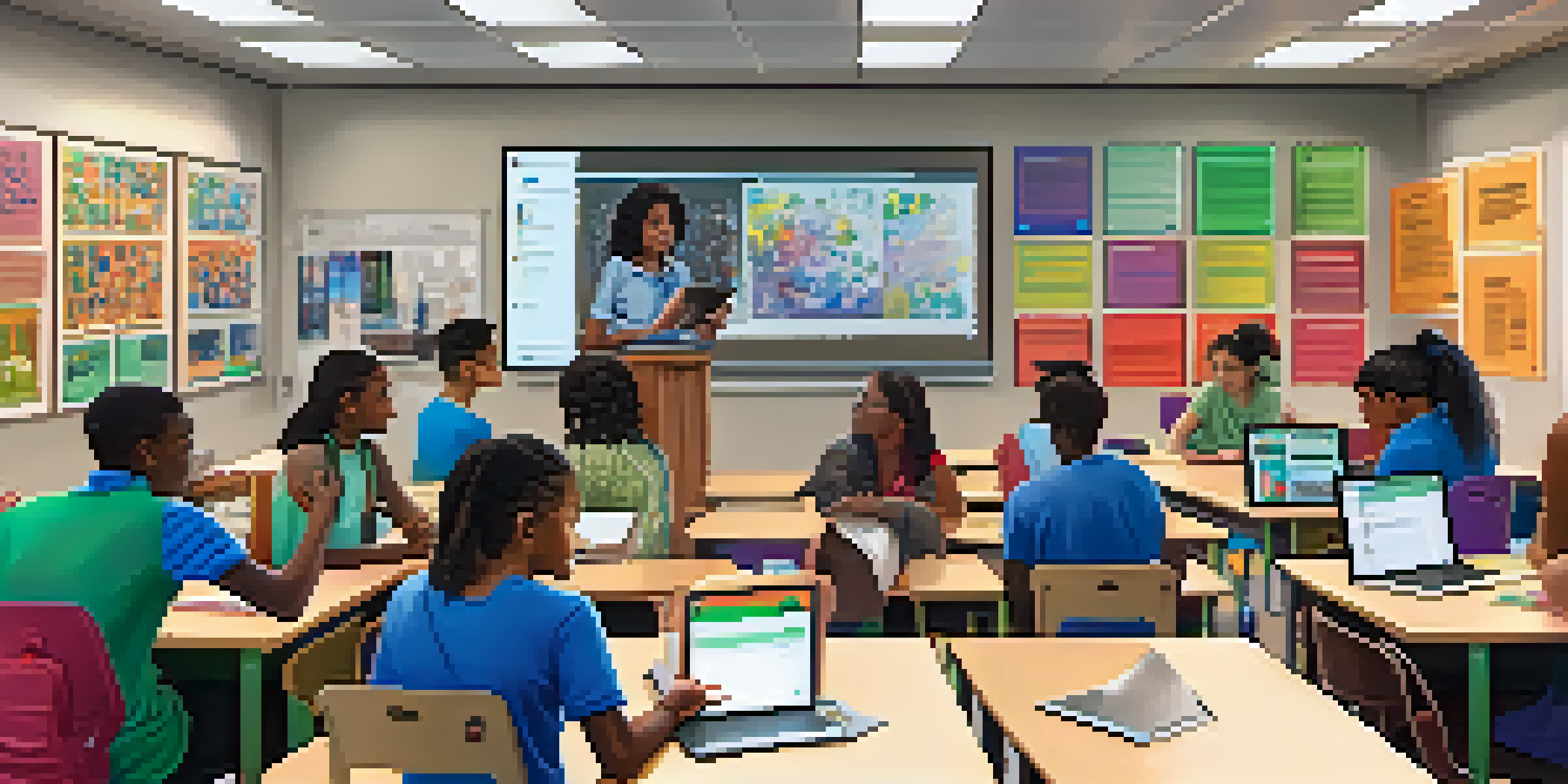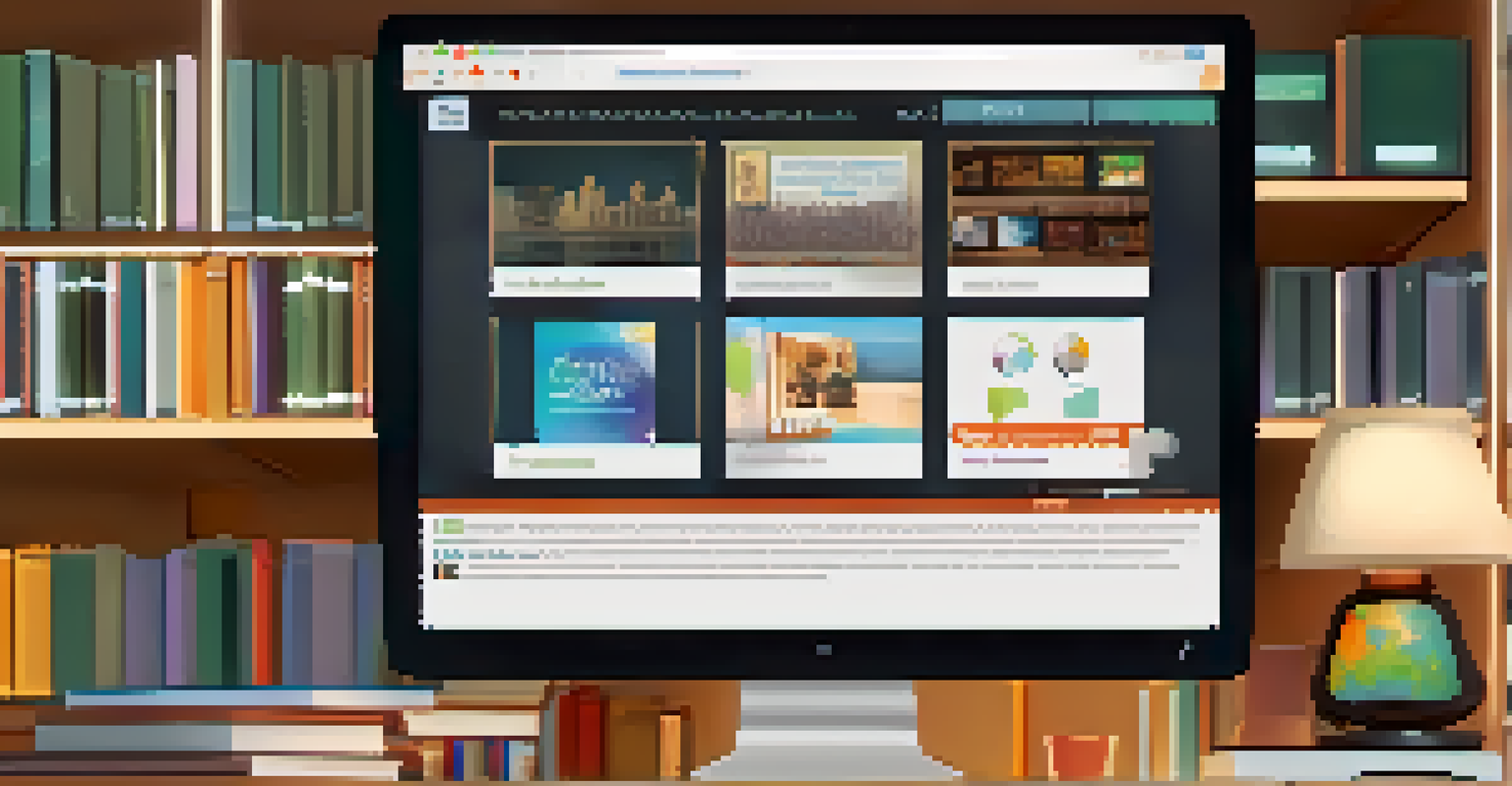The Ethics of Open Educational Resources (OER)

Understanding Open Educational Resources and Their Impact
Open Educational Resources (OER) are teaching, learning, and research materials that are freely accessible and openly licensed. They can include textbooks, course materials, and even entire courses, allowing anyone to use them without financial barriers. This openness offers a significant opportunity for enhancing education, especially in underfunded areas where resources are scarce.
Education is the most powerful weapon which you can use to change the world.
However, the very nature of OER raises ethical questions about quality, accessibility, and ownership. Since anyone can create and share OER, there is a risk of disseminating outdated or inaccurate information. Ensuring that these resources are not only available but also effective necessitates a careful evaluation of their content and a commitment to continuous improvement.
Moreover, the impact of OER is not felt equally across different demographics. While some learners may benefit greatly from these resources, others might face challenges related to technology access or digital literacy. Recognizing these disparities is crucial for policymakers and educators to ensure that OER truly serves its purpose of democratizing education.
The Importance of Equity in OER Access
Equity in education is a fundamental ethical principle, and OER has the potential to level the playing field. By providing free access to high-quality educational materials, OER can help reduce barriers for marginalized groups. However, achieving true equity goes beyond just making resources available; it also involves addressing the systemic issues that affect access to education.

For instance, consider a student in a rural area with limited internet access. Even if they can find OER online, they may not be able to utilize them effectively without reliable connectivity. This situation underscores the need for initiatives that not only promote OER but also invest in infrastructure to support equitable access to digital learning.
OER Enhances Educational Access
Open Educational Resources provide free access to learning materials, which can significantly improve education in underfunded areas.
Ultimately, ensuring equity in OER requires collaboration among educators, institutions, and policymakers. By acknowledging and addressing these challenges, we can create a more inclusive educational landscape where all learners can thrive, regardless of their circumstances.
Intellectual Property Rights and OER
One of the most compelling features of OER is that they often come with open licenses, such as Creative Commons. These licenses allow creators to specify how their work can be used, shared, and modified. However, this raises ethical questions about intellectual property rights and the responsibilities of both creators and users in respecting these rights.
The great aim of education is not knowledge but action.
For example, a teacher who adapts an OER for their classroom must credit the original author and adhere to the terms of the license. Misunderstanding these requirements can lead to unintentional plagiarism or misuse of resources. Therefore, it is essential for educators and learners to familiarize themselves with OER licensing to foster a culture of respect and integrity.
Moreover, as OER continues to grow, so too does the conversation around authorship and credit. It’s important for institutions to recognize and reward educators who contribute to OER, ensuring that their efforts are valued and that they continue to share their expertise in a responsible manner.
Quality Assurance in Open Educational Resources
With the proliferation of OER, ensuring the quality of these materials has become a pressing ethical concern. Unlike traditional educational resources that often go through rigorous editorial processes, OER can be created by anyone, leading to variability in quality. This inconsistency poses a risk to learners who rely on these resources for their education.
To address this issue, many organizations are developing frameworks for evaluating OER quality. These frameworks often include criteria such as accuracy, relevance, and alignment with learning standards. By adhering to these guidelines, creators can enhance the credibility and effectiveness of their OER, ensuring they meet the needs of diverse learners.
Equity is Key for OER Success
Achieving true equity in OER access requires addressing systemic issues and ensuring that all learners, regardless of location or resources, can benefit.
Furthermore, fostering a feedback loop where users can share their experiences and suggestions can significantly improve OER quality. By engaging the community, we not only enhance resource quality but also build a collaborative culture that values continuous improvement and learner input.
Ethical Use of OER in the Classroom
While OER offers a wealth of opportunities, ethical considerations must also guide their use in the classroom. Educators should thoughtfully integrate these resources, ensuring they align with curricular goals and the diverse needs of their students. This deliberate approach helps to prevent the potential pitfalls of using materials that may not be suitable for all learners.
Moreover, transparency is vital when incorporating OER into teaching. Educators can share their rationale for choosing specific resources, highlighting their relevance and effectiveness. This openness fosters trust and encourages students to engage critically with the materials, enhancing their learning experience.
Additionally, promoting student agency in selecting OER can empower learners to take ownership of their education. By involving students in the decision-making process, educators can cultivate a more inclusive and collaborative learning environment, ultimately enriching the educational experience.
The Role of Collaboration in OER Development
Collaboration is at the heart of the OER movement. By working together, educators, institutions, and organizations can pool their resources and expertise to create high-quality, diverse educational materials. This collective effort not only enhances the quality of OER but also ensures that a wider range of perspectives and voices are represented.
For example, a team of educators from different disciplines can create an interdisciplinary OER that addresses a complex topic from multiple viewpoints. This not only enriches the content but also models collaborative learning for students. Moreover, sharing the workload can alleviate the burden on individual educators, making OER development more manageable.
Quality Assurance is Essential
As OER proliferates, establishing quality assurance frameworks is crucial to ensure these resources meet educational standards and effectively support diverse learners.
Furthermore, collaboration extends beyond content creation. By sharing best practices and strategies for implementing OER, educators can support each other in navigating challenges. This spirit of cooperation is essential for building a sustainable OER ecosystem that benefits everyone involved.
Future Ethical Considerations for OER
As OER continues to evolve, new ethical considerations are emerging that require attention. For instance, the rapid advancement of technology may lead to new formats and delivery methods for OER, which could raise questions about accessibility and inclusivity. It is essential to prioritize these issues to ensure that all learners can benefit from future innovations.
Additionally, the commercialization of OER poses ethical challenges. As more companies enter the space, there is a risk that the core values of openness and accessibility could be compromised. Maintaining a focus on the primary mission of OER—providing free and equitable access to education—will be crucial in navigating this landscape.

Ultimately, fostering an ongoing dialogue about the ethics of OER will help educators and stakeholders adapt to these changes. By reflecting on our values and responsibilities, we can ensure that OER remains a powerful tool for promoting education and equity in the years to come.